Civil Liberties, Civil Rights, Freedom Of Speech, Gaza, U.S. Militarism, Violations of U.S. and International Law, War Resister
Podcast: Play in new window | Download


A New Nuclear Non-Proliferation Agreement Amid Tension
In 2015 the United States and Iran negotiated an agreement designed to allow Iran to develop peaceful uses of nuclear energy, but not nuclear weapons. That agreement was terminated in 2018 during Trump’s first administration, and sanctions on Iran were re-imposed, sanctions that have proven to be very damaging to Iran’s financial well-being. Now, Trump has said his new administration is prepared to enter into a new nuclear non-proliferation agreement with Iran. But at the recent conclusion of what was the third round of U.S.-Iran negotiations on the issue, negotiations that appear to have gathered momentum, Israel’s Netanyahu has demanded that even Iran’s nuclear program for peaceful uses be dismantled, something Iran has steadfastly refused to consider.
Will Israel be successful in opposing Iran’s development of a nuclear program even if it is limited to peaceful uses? If Iran will not agree to give up its peaceful uses of nuclear energy, is a war between Israel and Iran inevitable? Meanwhile, the back-and-forth attacks by Israel on Iran and Iran on Israel continue. Just last week the Houthis, an Iran proxy, dropped a missile near Israel’s Ben Gurion Airport. All of this raises the question, “Would the Trump Administration join Israel if it waged war on Iran, perhaps including its nuclear facilities and how would other Middle Eastern nations respond if war did break out between Israel and Iran and, perhaps, with the United States fighting alongside Israel?”
Guest – Richard Becker is the Western Regional Coordinator of the ANSWER—Act Now to Stop War and End Racism—Coalition, and the author of Palestine, Israel the U.S. Empire and of the book The Myth of Democracy and the Rule of the Banks.
—-
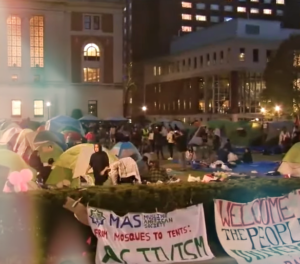

Entrenching Authoritarianism: Expanding the Terrorism Framework and the Infrastructure of Surveillance to Repress Expression and Stifle Dissent
Recently, the Center For Constitutional Rights along with a group of four human rights organizations together with legal clinics published a new report urging the United Nations to denounce the accelerated disintegration of democracy in the US. The report focuses on the US government’s increasing criminalization and repression of free speech, dissent, and protest under the guise of “national security.” The report was then submitted to the United Nations Human Rights Council, which is scheduled to formally review the United States compliance with its human rights obligations in November. The link to the report is above.
Guest – Attorney Nadia Ben-Youssef, the Advocacy Director at the Center for Constitutional Rights is quoted saying “Our hope is that the report sounds the alarm for the international community to act with greater urgency to challenge this administration and its belligerent efforts to dismantle constitutional protections and international law.” She directs all advocacy around issues related to the promotion of civil and human rights. Together with the legal, advocacy, and communication teams, Nadia identifies opportunities for the Center for Constitutional Rights to make strategic cultural and political interventions that shift public narrative and policy on our issues.

Civil Liberties, Civil Rights, Freedom Of Speech, Gaza, Human Rights, U.S. Militarism, War Resister
Podcast: Play in new window | Download
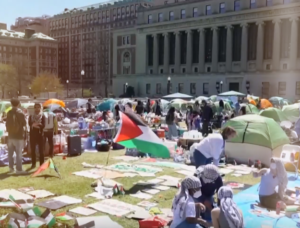
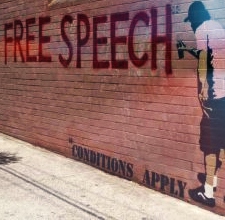
A Constitutional Crisis In The United States
America is in the midst of a constitutional crisis. More than 200 lawsuits have been filed against the Trump administration during his first 100 days in office, resulting in more than 100 injunctions and stays, as he lays waste to fundamental constitutional protections and laws passed by Congress.
On the first day of his second term, Donald Trump had the audacity to sign an executive order claiming he was “restoring freedom of speech.” Instead, his administration is systematically destroying the right to speak freely, to write freely, to dissent freely, and to protest freely.
Trump ordered the elimination of “diversity, equity, and inclusion” (DEI) policies in both the public and private sectors and targeted several leading American universities, threatening to withhold federal funding for indoctrinating students with “woke” ideology, and for failing to combat antisemitism, by which he means criticism of Israel. He shut down the Voice of America and the Smithsonian Museum. He canceled the security clearances, government contracts, and access to federal buildings of several prominent law firms because he didn’t like the clients they represented. He even excluded the Associated Press from the White House because it refused to call the Gulf of Mexico, the Gulf of America.
In one of the most egregious violations of the First Amendment, the Trump administration canceled foreign student visas and deported legal permanent residents, claiming their campus protests were contrary to U.S. foreign policy interests.
Guest – Dahlia Taha, is a Policy Manager at the Muslim Public Affairs Council, where she leads the First Amendment and Civil Liberties work. Dahlia is a Palestinian-American Muslim. Prior to joining the MPAC team, she served as a Project Manager at The Texas A&M Foundation, where she researched and analyzed maternal health policy. At MPAC, Dahlia works to champion policies and initiatives that uplift and advocate for the Muslim Community nationwide, with a particular focus on protecting the First Amendment, academic institutions, and the next generation of American Muslims.
I am particularly pleased to have Dahlia with us today, because she and I are about to launch a podcast called Rapid Response, sponsored by MPAC, in which we will examine the struggle of students and community members – Muslims, Jews, and allies -, who have been targeted by the Trump administration for expressing political views in favor of Palestinian rights and sovereignty which the government is seeking to suppress.
—-
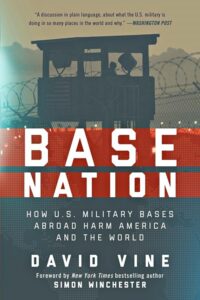
![]()
![]()
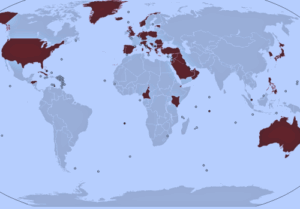
Base Nation: How U.S. Military Bases Abroad Harm America and the World
One of the most consequential pillars of U.S. military power is also one of its most overlooked: our vast network of overseas military bases. In his meticulously researched book Base Nation: How U.S. Military Bases Abroad Harm America and the World, author and anthropologist David Vine reveals how more than 800 U.S. military installations scattered across foreign lands are not merely symbols of strength—they’re often sources of harm. From the Pacific islands to the Middle East and Europe, these bases have become fixtures of American empire. However, they rarely receive the scrutiny they deserve from policymakers or the public.
Vine documents how this sprawling base network fuels geopolitical tension, fosters anti-American resentment, and props up authoritarian regimes. He shows how bases displace local populations, pollute ecosystems, and even affect the mental health and family lives of U.S. troops stationed abroad. And while Pentagon officials downplay the cost, Vine’s analysis reveals that maintaining these foreign outposts drains nearly $100 billion each year from U.S. taxpayers—money that could instead fund urgent domestic priorities.
Perhaps most troubling is how these bases have enabled decades of interventionist wars, making it easier for the U.S. to engage militarily across the globe without addressing root causes of conflict or engaging in genuine diplomacy.Our guest will discuss what a post-base foreign policy might look like, who benefits from the current system, and what’s behind the emerging bipartisan calls to rein it in
Guest – David Vine is a writer and political anthropologist. David was a professor of anthropology at American University for 18 years (2006-2024), He is also the author of Island of Shame: The Secret History of the US Military Base on Diego Garcia.

———————
Civil Liberties, Civil Rights, Freedom Of Speech, Human Rights, Supreme Court
Podcast: Play in new window | Download
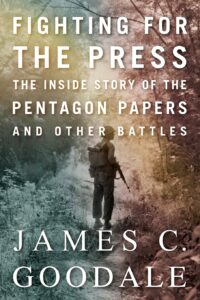
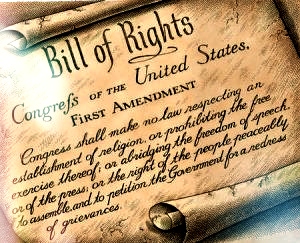
James Goodale: Fighting for the Press and Freedom of Speech
Donald Trump has wasted no time in his second term attacking free speech and freedom of the press. He arrested Mahmoud Khalil, a permanent US resident with a green card and a student visa, and is trying to deport him (until restrained by a federal judge) because Khalil led pro-Palestinian protests at Columbia University. He has threatened to deport other students for their pro-Palestinian protests. Trump banned the Associated Press from White House press briefings and Air Force One for using the term “Gulf of Mexico” instead of “Gulf of America.”
He also banned Reuters News Service and Huffington Post from the press pool. He has issued Executive Orders which federal agencies have cited as authority to ban forbidden words from government websites such as the words Diversity, Equity, and Inclusion. He’s threaten to pull federal funding from over 50 universities for teaching aspects of American history such as slavery and racism, which he labels “divisive.” He has encouraged congressional investigations against Democrats who served on the January 6 Committee.
He has promoted a definition of “antisemitism” which would punish political criticism of Israel. And he has filed lawsuits seeking hundreds of million of dollars in damages against ABC, CBS, Media Matters for America, and newspapers based on how they have reported on him, his candidacy, and his actions as President.
Guest – James Goodale is the former vice president and general counsel for The New York Times and, later, the Times’ vice chairman. He is the author of Fighting for the Press: The Inside Story of the Pentagon Papers and Other Battles. Goodale represented The New York Times in four of its United States Supreme Court cases, including Branzburg v. Hayes, in which the Times intervened on behalf of its reporter Earl Caldwell. The other cases were New York Times v. Sullivan, New York Times Co. v. United States (the Pentagon Papers case), and New York Times Co. v. Tasini. He has been called “the father of the reporter’s privilege” in the Hastings Law Journal because of his interpretation of the Branzburg case.
—-
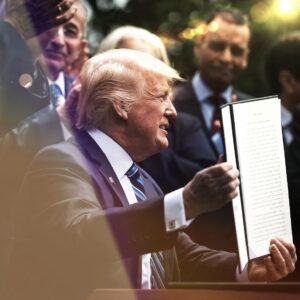
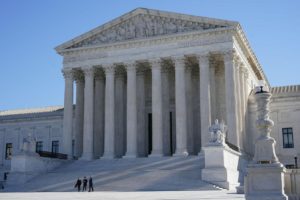
Pushing The Limit Of Presidential Power
Since being sworn in for his second term on January 20, 2025, Donald Trump has signed (with a big black marker) almost 90 Executive Orders or EOs, stretching the limits of Presidential power. In response, over 100 lawsuits have been filed challenging the most egregious and questionable EOs. Some of the most sweeping orders seek to totally dismantle over 70 years of laws, policies, and programs promoting Diversity, Equity, Inclusion, and Accessibility. These EOs were immediately challenged in court. Meanwhile, some companies have surrendered to Trump and terminated their Diversity programs, while civil rights groups are fighting back.
Stephen’s recent article – First They Came For Mahmoud Khalil
Guest – Stephen Rohde is a writer, lecturer and political activist. For almost 50 years, he practiced civil rights, civil liberties, and intellectual property law and has won significant First Amendment victories in state and federal appellate courts. He is a past chair of the ACLU Foundation of Southern California and past National Chair of Bend the Arc, a Jewish Partnership for Justice. He is a founder and current chair of Interfaith Communities United for Justice and Peace; member of the Board of Directors of Death Penalty Focus, and a member of the Black Jewish Justice Alliance. He is the Special Advisor on Free Speech and the First Amendment for the Muslim Public Affairs Council.
Mr. Rohde is the author of the books American Words of Freedom: The Words That Define Our Nation and Freedom of Assembly and numerous articles and book reviews on civil liberties and constitutional history for the Los Angeles Review of Books, American Prospect, LA Times, Ms. Magazine, Los Angeles Lawyer, LA Progressive, Truthdig and other publications.

———————————-
Civil Liberties, Civil Rights, Criminalizing Dissent, Freedom Of Speech, Gaza, genocide, Human Rights, War Resister
Podcast: Play in new window | Download

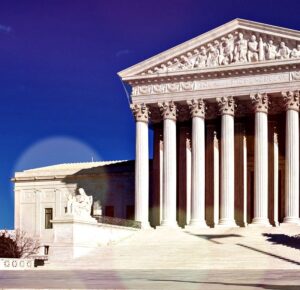
Federal Court Challenges to Trump Administration Arguments
The number of active lawsuits in federal courts challenging Trump administration arguments has now topped 100. In 21 of those cases, judges have already issued temporary restraining orders or preliminary injunctions, effectively stopping, at least for now, parts of Trump’s agenda.
For example, as reported in the New York Times this past Sunday, trial court judges have blocked for now Trump’s mass firings of civil servants, Musk’s access to sensitive federal agency data, the relocation of transgendered women inmates to men’s prisons, the pursuit of immigrants inside houses of worship, and the freezing of up to $3 trillion of federal funding to the states. And in a very important case, a federal judge entered a final judgment reinstating the head of the federal watchdog agency. And just yesterday, the Supreme Court ruled against the Trump Administration halting the sending out of those billions of foreign aid dollars.
But it must be pointed out that in a number of preliminary victories against Trump’s actions, the government, though losing the first round in the case, have nevertheless stalled in obeying the court’s orders. And Trump, himself, posted the absolutist notion that, “He who saves his Country does not violate any Law.”
Five of the judges who have ruled against Trump were appointed by Republican presidents, one by Trump himself. As a result of Trump’s losing record in court cases so far, there is now talk on the right of seeking to impeach judges who rule against the Trump Administration. And the number of death threats judges are experiencing from the public have gone up alarmingly, as well.
Guest – Stephen Rohde is a civil rights activist, author, and constitutional scholar. He practiced civil rights law for almost 50 years. He currently serves as chair of the Interfaith Communities United for Justice and Peace (aka ICUJP), which was formed in the wake of 9/11 for the purpose of organizing faith-based communities to call for an end to war and violence. He is also a past President of the ACLU Foundation of Southern California, and past Chair of Death Penalty Focus, and Bend the Arc: A Jewish Partnership for Justice. Despite that long list of affiliations, today he’s not speaking on behalf of any of those organizations.
—-

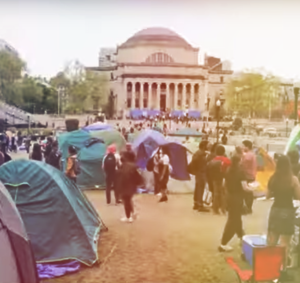
Free Speech Protections Threatened Under Trump Administration
On March 4, 2025, President Donald Trump threatened to cut federal funding to colleges that permit what he calls “illegal protests.” This statement on social media has sparked a wave of reactions from civil rights groups as a direct attack on fundamental freedoms such as speech and assembly.
In his post, Trump echoed ideas from previous executive orders, including his 2019 order and one issued in January, which specifically targeted pro-Palestinian student protests on college campuses, calling them antisemitic. But Trump’s latest comments go further, asserting that any protest deemed illegal would lead to harsh consequences, including the imprisonment of agitators and expulsion or arrest of American students. The details, however, remain unclear, particularly around how the government would define “illegal protests” or the enforcement of such measures.
Trump’s latest threat has reignited concerns about the balance between freedom of speech and government intervention on college campuses. It also raises important questions about the rights of students, faculty, and protesters in the context of broader political and social movements.
Guest – Attorney Mara Verheyden-Hilliard from the Partnership for Civil Justice Fund and the Center for Protest Law and Litigation in Washington, DC. Mara is one of the nation’s leading litigators defending protesters and winning numerous reforms in police practices at mass assemblies and demonstrations.

———————–
Academic Freedom, Censorship, Freedom Of Speech, Gaza, genocide, Human Rights, Targeting Muslims
Podcast: Play in new window | Download
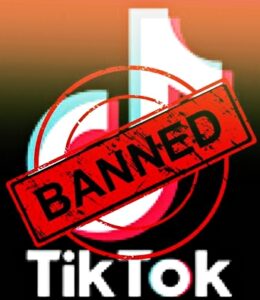
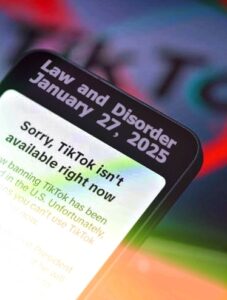
The First Amendment And TikTok
On January 17, for the first time in modern American history, a unanimous US Supreme Court upheld a sweeping prior restraint on free speech imposed by Congress banning over 170 million users in the United States from having access to the popular social media platform TikTok that the Court itself admitted “allows users to create, publish, view, share, and interact with short videos overlaid with audio and text.” In 2023 alone, U. S. TikTok users uploaded more than 5.5 billion videos, which were in turn viewed more than 13 trillion times around the world. The avoid the ban, the law requires TikTok’s parent company, the China-based ByteDance, to divest its ownership.
From January 18 to 19, the ban was in effect for about 12 hours until Donald Trump tweeted that as President he would grant a stay of execution, pending a potential sale of TikTok. It was only 12 hours some may say, but it is estimated that during that time the ban blocked 6,750,000 videos that would have been viewed over 178,000,000 times worldwide. The ban is easily the most extensive act of censorship in human history.
Shortly after he was sworn in, Trump signed an Executive Order purporting to suspend the ban for 75 days. Serious questions have been raised whether Trump’s order is legal and enforceable. And despite his order, Apple and Google have still not reinstated TikTok at their stores preventing new subscribers from accessing TikTok.
Meanwhile, the First Amendment rights of 170 million TikTok users hang in the balance.
Guest – Ramya Krishnan is a senior staff attorney at the Knight First Amendment Institute at Columbia University and a lecturer in law at Columbia Law School. Her litigation focuses on issues related to government transparency, protest, privacy, and social media. Ramya co-authored the Knight Institute’s amicus brief in TikTok. v. Garland, one of the lawsuits challenging the constitutionality of the TikTok ban which resulted in the Supreme Court’s decision. Read Amicus Brief
—-

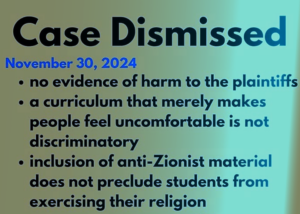
Federal Court Rejects Attempt To Remove Ethnic Studies Curriculum
As Israel’s war in Gaza and the West Bank rages on, the free speech battles here in the United States continue with Congress, state legislatures and college administrators trying to silence pro-Palestinian protests by conflating criticism of Israel with the odious epithet of “antisemitism.” Pro-Palestinian groups are being banned, students are being disciplined, and faculty members are being suspended and fired.
But last November, there was some hopeful news when a federal court rejected attempts by Jewish parents and teachers to remove an ethnic studies curriculum from the Los Angeles Unified School District that they had labelled “antisemitic” and “anti-Zionist.”
On November 30, 2024, in a 49-page ruling, U.S. District Judge Fernando M. Olguin wrote that a system of education “which discovers truth out of a multitude of tongues” must allow teachers and their students “to explore difficult and conflicting ideas.” He added that “we must be careful not to curb intellectual freedom by imposing dogmatic restrictions that chill teachers from adopting the pedagogical methods they believe are most effective,”
The ruling represents a welcome rebuke to the efforts of Republican state legislators and conservative parent groups to try to restrict the teaching of comprehensive American history in public schools, to ban books that examine that history as well as racism, sexism, and LGBTQ issues, and to eliminate programs that seek to ensure diversity, equity, and inclusion in American education.
In 2022, a group calling itself “Concerned Jewish Parents and Teachers of Los Angeles,” comprised of what the lawsuit calls Jewish, Zionist teachers and parents of students sued the Los Angeles Unified School District; United Teachers of Los Angeles; its president Cecily Myart-Cruz; the Liberated Ethnic Studies Model Curriculum Consortium; Theresa Montaño, the Consortium’s secretary; and Guadalupe Carrasco, its co-founder.
To discuss the important free speech and academic freedom issues involved in this case, we’ve invited the lawyer who represented the ethnic studies curriculum, Ms Montano and Ms Carrasco.
Guest – Mark Kleiman is a former activist and organizer and a long-time civil rights and human rights attorney. With extensive experience in whistleblower protection, he has brought cases that exposed massive fraud against public programs and has forced drug companies, nursing home chains, and defense contractors to repay hundreds of millions of dollars. Since 2019 he has devoted thousands of hours to defending activists, scholars, and students who have been attacked for their defense of Palestinian human rights.

————————-
Freedom Of Speech, Gaza, Human Rights, Targeting Muslims, U.S. Militarism, Violations of U.S. and International Law, War Resister
Podcast: Play in new window | Download


Journalists Under Fire In Israel-Gaza Conflict
Today we turn to the status of press freedom in Israel. Since the Hamas attack on October 7, 2023, and during the ensuing war in Gaza ever since, which is now moving into the West Bank, the pressure on journalists who are trying to cover what’s been happening there is increasing… and more dangerous.
According to the New York-based Committee To Protect Journalists, the Israel-Gaza war has claimed the lives of more journalists over the course of a year than in any other conflict the organization has documented. They estimate 128 journalists killed and 69 imprisoned.
The foreign and Israeli journalists who are bold enough to enter Gaza to report on what’s happening can only do so if they are accompanied by Israeli forces… and under strict surveillance. And the Israeli military has no qualms about shutting down news outlets like Al Jazeera – even its bureau in Ramallah, in the West Bank, which is an area supposedly under Palestinian control.
And just last week, Israeli Occupational Forces arrested a US citizen, journalist Jeremy Loffredo, charging him with endangering national security for his reporting on Iranian strikes. Reporters Without Borders condemns what it calls Israel’s climate of intimidation, and has called on the Israeli authorities to stop obstructing the work of journalists covering the war.
Guest – Kevin Gosztola is a journalist and editor of The Dissenter Newsletter, which regularly covers whistleblowing, press freedom, and government secrecy. He is the author of Guilty of Journalism: The Political Case Against Julian Assange and known for his work reporting on the extradition proceedings against Assange and the court-martial against Chelsea Manning. Both were prosecuted and convicted under the Espionage Act.
—-

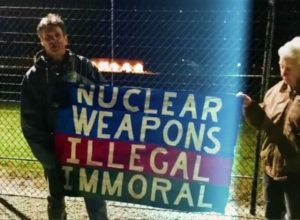
Back From The Brink 2024
One issue from the Cold War topic stills looms large today: the growing threat of nuclear war. While many hoped the end of the Cold War would signal a retreat from the nuclear arms race, recent developments suggest otherwise. Tensions between amid U.S., Russia, and China have escalated, and key nuclear arms control treaties, such as the INF Treaty have eroded, with the future of the New START agreement uncertain.
The war in Ukraine, punctuated by Russia’s nuclear saber-rattling, has revived fears of potential nuclear escalation. At the same time, huge sums are being funneled into expanding and modernizing nuclear arsenals. In several decades, it is estimated that the total cost of modernizing and maintaining the U.S. nuclear arsenal amounts to approximately $1.7 trillion. Emerging technologies, like hypersonic missiles and Artificial Intelligence in military decision-making, further complicate the stability of nuclear deterrence, raising new questions about global security.
Guest – Dr. Ira Helfand is a member of the International Steering Group of the International Campaign to Abolish Nuclear Weapons, or ICAN, which was awarded the 2017 Nobel Peace Prize. Dr. Helfand is also the immediate past president of the International Physicians for the Prevention of Nuclear War, or IPPNW, a founding partner of ICAN and itself the recipient of the 1985 Nobel Peace Prize. He co-founded and served as past president of Physicians for Social Responsibility, the US affiliate of IPPNW. Dr. Helfand is also co-founder of the Back from the Brink campaign, the key vehicle for people in the U.S. who want to get involved in this issue.

—————————























